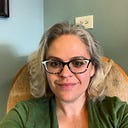Member-only story
Society
Powerful Storytelling
Through the eyes of many people, my life was incredibly average. I am a 5 foot, 3 inches tall, average weight, White, and now middle-aged, female. I grew up in suburban Chicago to parents that are still married today. Most members of my large extended family lived nearby when I was a child, so I had plenty of cousins as friends. My mom stayed home and raised her kids, but babysat for neighbors and did the odd creative project to bring in extra cash. Our house was a basic split level, 3 bedroom, 2 bathroom ranch with a small yard. We owned a Shih-tzu dog and I had two younger brothers. Everything a person could witness about me externally appeared very very average.
As a teenager, I saw the same things about myself that I thought others saw. I worked a typical retail job in high school, and found ways to have fun with my friends on the weekend —weeknights at the shopping mall, weekend dinners at TGIFridays and Olive Garden, and late nights at teen dance clubs with names like Zero Gravity. I bought myself nice clothes with income from the after-school job, but my parents were neither rich nor poor. I ran track and cross country and always finished the race right in the middle of the pack; never first and never last. I was never extremely popular but I was also never bullied. Very, very average.
But I was anything but average. I was rare. I was been born with a severe form of a rare metabolic disorder called Phenylketonuria. For many decades of my life, I never qualified it as a significant factor because it was invisible. I was not particularly enthusiastic about anyone knowing me for something that was wrong with my body. I also did not know everything I know now. When I entered high school, the Americans with Disabilities Act was still a young piece of legislation. No internet line ran through our home to tell me or my parents anything about my new rights in 1990. However, my disease did not disappear just because no one else saw it. Not only did I not see my disease, I ignored its treatment protocols as if it should just go away if I pretended it didn’t exist. I should have fought for accommodations when I was young, but I was genuinely not aware of the possibility.
I carried my disease with me through college, and started to wrestle with it in my twenties. By this time, I was mature enough not…
